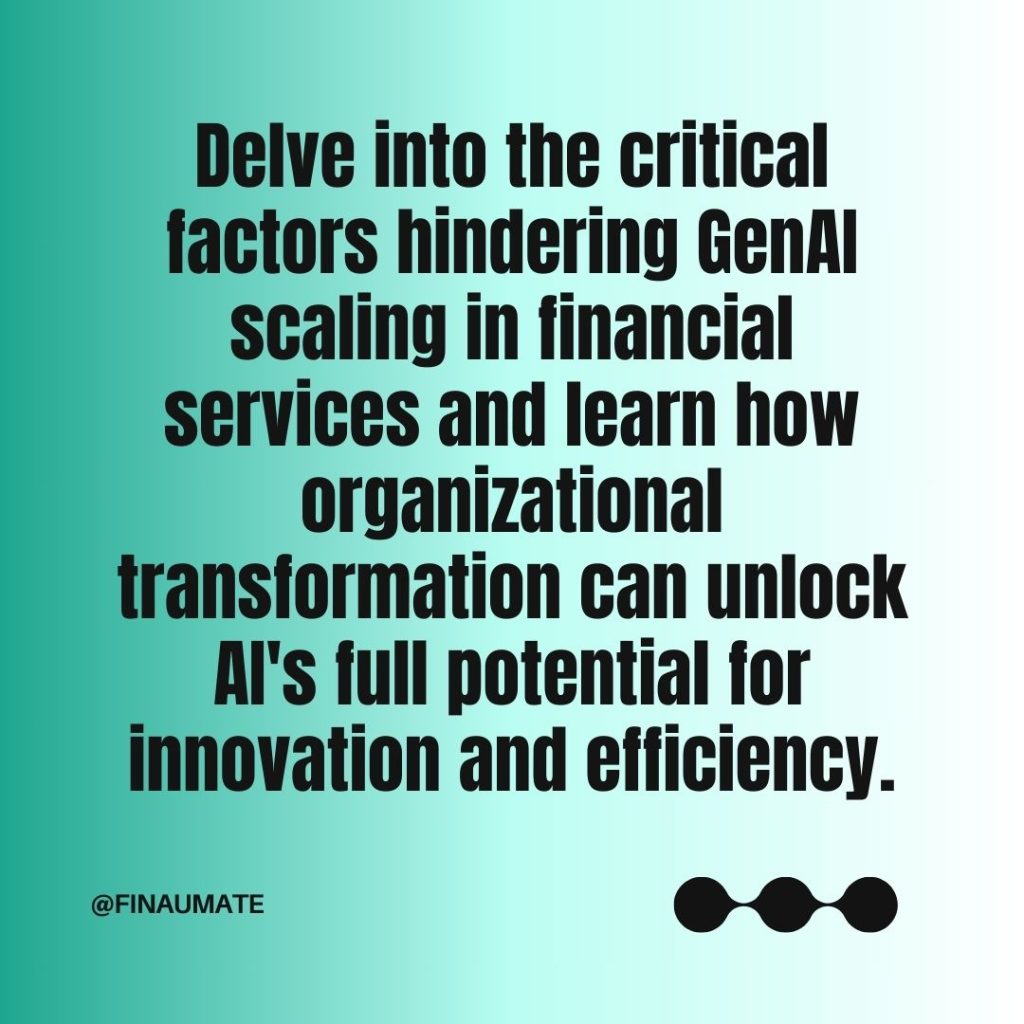In today’s world of financial services, Generative AI adoption (GenAI) has undoubtedly emerged as a transformative force. It promises enhanced efficiency, personalized customer experiences, and innovative financial products. However, as financial institutions embark on this technological journey, they encounter significant challenges that impede large-scale adoption. Understanding and addressing these hurdles is crucial for organizations aiming to harness GenAI’s full potential.
Key Takeaways:
- Scaling GenAI in Financial Services is the Next Big Challenge
While financial institutions have made progress in adopting GenAI, most are struggling to scale. They find it difficult especially beyond a handful of solutions due to governance, infrastructure limitations, and skill shortages. - Governance, Infrastructure, and Skills Are the Main Roadblocks
Complex governance structures, legacy IT systems, and a shortage of AI talent are the biggest barriers to scaling GenAI. These are not AI-specific problems but stem from long-standing operational challenges in large financial institutions. - Strong Leadership and Strategic Overhaul Are Essential for Success
To overcome these challenges, financial institutions need streamlined decision-making. They also need better IT-business alignment, and ongoing investment in AI talent and infrastructure to unlock the full potential of GenAI.
Current Landscape of GenAI Adoption in Financial Services
Over the past few years, GenAI has gained substantial traction within the financial sector. A recent study revealed that 52% of financial services firms are actively utilizing GenAI, reflecting a significant increase in adoption rates. Important to mention that the GenAI adoption highly depends on the prioritization of initiatives an institution can have, something we wrote about HERE.
Despite this progress, many institutions find themselves at an inflection point, struggling to transition from pilot projects to enterprise-wide implementation. This bottleneck often stems from challenges related to governance, infrastructure, and skill shortages.
Key Challenges Hindering GenAI Adoption and Scaling
- Governance and Regulatory Compliance – Implementing GenAI necessitates robust governance frameworks to ensure ethical use, data privacy, and compliance with regulatory standards. Financial institutions face the intricate task of balancing innovation with stringent regulatory requirements. The lack of clear guidelines or legislation for AI use in finance adds to the complexity. Consequently making it imperative for organizations to establish internal policies that align with evolving regulations as can be found HERE.
- Infrastructure and Data Management – The deployment of GenAI requires scalable and secure IT infrastructure capable of handling vast amounts of data. Many financial institutions grapple with legacy systems that are not optimized for AI workloads, leading to integration challenges. Additionally, ensuring data quality and accessibility is paramount, as GenAI models are highly sensitive to the data they are trained on. Poor data quality can lead to inaccurate predictions, undermining trust in AI systems.
- Skills and Talent Gap – The rapid evolution of GenAI technologies has outpaced the availability of professionals equipped with the necessary skills to develop, implement, and manage these systems. Furthermore, financial institutions often struggle to attract and retain talent proficient in AI and machine learning. This skills gap hampers the ability to scale AI initiatives effectively, as existing staff may lack the expertise required to oversee complex AI projects.

The Imperative for Organizational Transformation in GenAI Adoption
The competitive landscape of financial services is increasingly influenced by technological advancements. Therefore, institutions that successfully scale Generative AI adoption stand to gain a significant edge in terms of product innovation. Conversely, those that lag may find themselves at a disadvantage. To navigate this paradigm shift, organizations must undergo a comprehensive transformation that includes:
- Streamlined Decision-Making: Reducing bureaucratic layers to expedite AI adoption and implementation.
- Cross-Functional Collaboration: Fostering collaboration between IT, compliance, and business units to align AI initiatives with organizational goals.
- Continuous Learning and Development: Investing in upskilling programs to equip employees with AI competencies, thereby bridging the talent gap.
Conclusion and Thoughts
Generative AI adoption is not merely a technological upgrade but a strategic imperative for financial institutions. As a result, by proactively addressing governance, infrastructure, and skill-related challenges, organizations can unlock the transformative benefits of GenAI. It is incumbent upon leadership to champion this evolution, fostering a culture that embraces innovation while safeguarding ethical standards and regulatory compliance.
GenAI is reshaping finance and banking – don’t get left behind. Our exclusive newsletter delivers insights you simply can’t afford to ignore. Subscribe HERE







